Related Research Articles
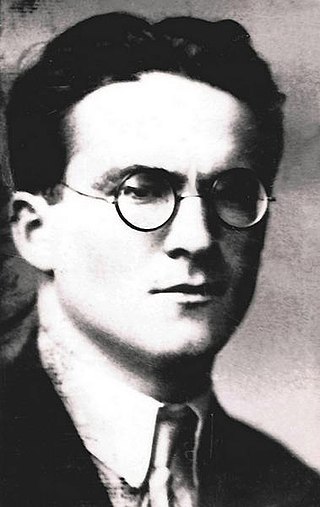
Mircea Eliade was a Romanian historian of religion, fiction writer, philosopher, and professor at the University of Chicago. One of the most influential scholars of religion of the 20th century and interpreter of religious experience, he established paradigms in religious studies that persist to this day. His theory that hierophanies form the basis of religion, splitting the human experience of reality into sacred and profane space and time, has proved influential. One of his most instrumental contributions to religious studies was his theory of eternal return, which holds that myths and rituals do not simply commemorate hierophanies, but actually participate in them.

Lucian Blaga was a Romanian philosopher, poet, playwright, poetry translator and novelist. He was a commanding personality of the Romanian culture of the interbellum period.
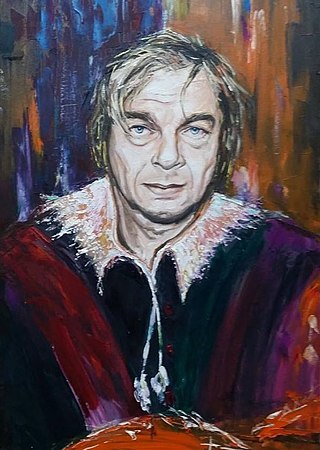
Nichita Stănescu was a Romanian poet and essayist.
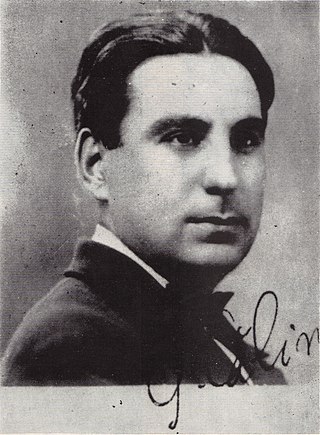
George Călinescu was a Romanian literary critic, historian, novelist, academician and journalist, and a writer of classicist and humanist tendencies. He is currently considered one of the most important Romanian literary critics of all time, alongside Titu Maiorescu and Eugen Lovinescu, and is one of the outstanding figures of Romanian literature in the 20th century.
Matei Alexe Călinescu was a Romanian literary critic and professor of comparative literature at Indiana University, in Bloomington, Indiana.
Mihai Rădulescu was a Romanian novelist, poet, historian, and art critic.
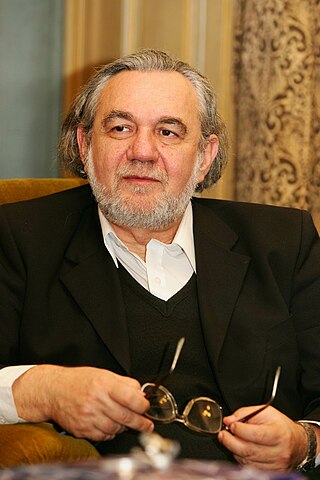
Andrei Oișteanu is a Romanian historian of religions and mentalities, ethnologist, cultural anthropologist, literary critic and novelist. Specialized in the history of religions and mentalities, he is also noted for his investigation of rituals and magic and his work in Jewish studies and the history of antisemitism. After the Romanian Revolution of 1989, he also became noted for his articles and essays on the Holocaust in Romania.
Petru Comarnescu was a Romanian literary and art critic and translator.
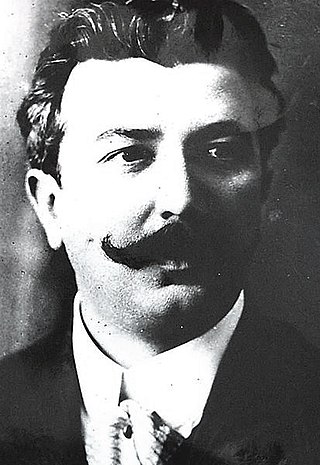
George or Gheorghe Ranetti, born George Ranete, was a Romanian poet, journalist and playwright, known as the founder and editor of Furnica magazine. A professional journalist from the late 1890s, he alternated between political dailies and literary reviews, being sympathetic to Romanian nationalism and traditionalism, and working under Ion Luca Caragiale at Moftul Român. By 1904–1906, he was active on the margin of left-wing traditionalism, or Poporanism, showing himself sympathetic to republican or generically anti-elitist ideologies. Such views and influences seeped into his activity at Furnica, which was for decades a prominent institution in Romanian humor.

Irina Petraș is a Romanian writer, literary critic, essayist, translator and editor.
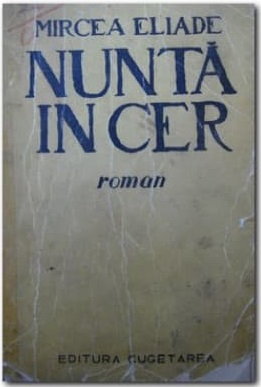
Marriage in Heaven is a 1938 novel by the Romanian writer Mircea Eliade. It consists of the correspondence between two unhappy men: one whose lover wanted children while he did not, and one who was abandoned by a woman who did not want children while he did. The plot has autobiographical elements from Eliade's relationship with his wife Nina.

Dumitru Almaș was a Romanian journalist, novelist, historian, writer and professor. His prolific output included children's literature, historical novels and textbooks. He was honored by both the Romanian Writers' Society and the subsequent Writers' Union of Romania. He also served as a member of the board of Society for Historical Sciences of Romania.
Constantin Gheorghe Banu was a Romanian writer, journalist and politician, who served as Arts and Religious Affairs Minister in 1922–1923. He is remembered in literary history as the founder of Flacăra review, which he published in two editions, alongside Petre Locusteanu, Ion Pillat, Adrian Maniu, and, later, Vintilă Russu-Șirianu. A best-selling magazine for its time, it functioned as a launching pad for several writers of the Romanian Symbolist movement.
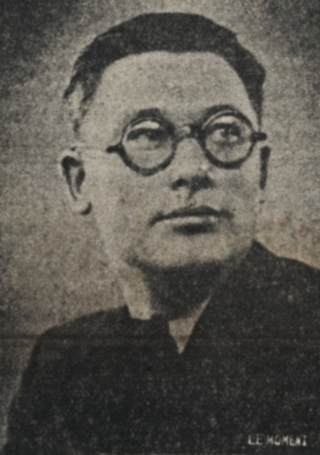
Ion Biberi was a Romanian psychiatrist and anthropologist, also active as an essayist, fiction writer, dramatist, translator and critic. Born into a mixed Romanian–French–German family, he spent most of his life in the Oltenian city of Turnu Severin, and was rather cut off from the center of culture in Bucharest. Young Biberi was interested in philosophy, literature, and popular science, including amateur astronomy and human genetics; his worldview was shaped by the works of Mihai Eminescu, Hippolyte Taine, Erwin Baur, and later Henri Bergson. He was also a child soldier in World War I, and his early experience of human disaster informed a lasting interest in thanatology. His first works were articles on scientific subjects published when he was still a teenager. At around that time, he also crossed paths with the younger author Mircea Eliade, who later became an additional influence on his work, and a generational leader.

Ioan Alexandru Brătescu-Voinești was a Romanian short story writer and politician. The scion of a minor aristocratic family from Târgoviște, he studied law and, as a young man, drew close to the Junimea circle and its patron Titu Maiorescu. He began publishing fiction as an adolescent, and put out his first book of stories in 1903; his work centered on the fading provincial milieu dominated by old class structures. Meanwhile, after a break with Maiorescu, he drew toward Viața Românească and Garabet Ibrăileanu. In 1907, Brătescu-Voinești entered the Romanian parliament, where he would serve for over three decades while his written output declined. In his later years, he became an outspoken anti-Semite and fascist, a stance that, following his country's defeat in World War II, gave way to anti-communism near the end of his life.

Ioan or Ion Bianu was an Imperial Austrian-born Romanian philologist and bibliographer. The son of a peasant family from Transylvania, he completed high school in Blaj, where he became a disciple of Timotei Cipariu and Ioan Micu Moldovan. As a youth, he espoused Romanian nationalism, and came into conflict with the Austro-Hungarian authorities, before finally emigrating to the Romanian Old Kingdom in 1876. There, he attended the University of Bucharest, later joining the faculty, where he taught Romanian literary history. He was affiliated with the Romanian Academy Library for over half a century, transforming the institution from the meager state in which he found it, and overseeing a five-fold increase of its collection. He helped author two important multi-volume works detailing early books and manuscripts from his country, and was a founder of library and information science in his adoptive country. Near the end of his life, struggling with deafness, Bianu withdrew from the Library in favor of his friend Radu R. Rosetti, but went on to serve as president of the Romanian Academy.
Ștefan Orășanu was a Romanian historian, literary critic and poet.

Poor Dionis or Poor Dionysus is an 1872 prose work by Romanian poet Mihai Eminescu, classified by scholars as either a novel, a novella or a modern fairy tale. It is a liberal interpretation of contemporary German philosophy and ancient motifs, discussing themes such as time travel and reincarnation through the lens of post-Kantian idealism. Its eponymous central character, a daydreaming scholar, moves between selves over time and space, between his miserable home, his earlier existence as a monk in 15th-century Moldavia, and his higher-level existence as a celestial Zoroaster.
The Criterion Association was a cultural group that held conferences, symposia, artistic events, and exhibitions in Bucharest, Romania, from 1932 to 1934. It was not the only such cultural group in Bucharest at the time but it attracted the most attention. Although its membership comprised many of the most promising minds of the Young Generation, the Criterion Association was not limited to the Young Generation and therefore those two groups are not interchangeable, as they so often mistakenly are taken to be. The association was a fruition of the Young Generation’s ambition.